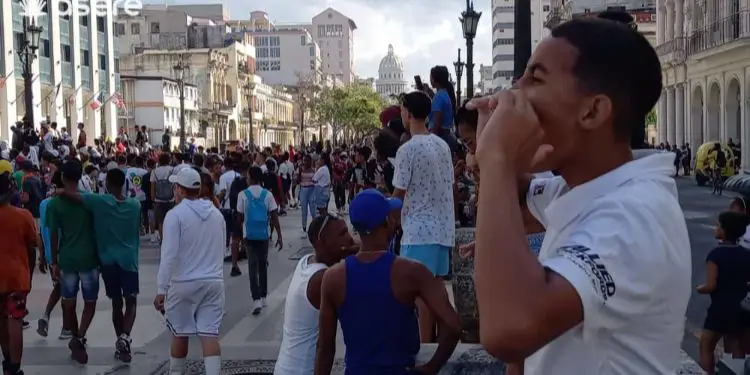Havana Cuba. — For a whopping 64 years, Cuba has been experiencing a “Process” that communist propaganda, violating semantics, insists on continuing to call “Revolution.” A fundamental characteristic of this sociopolitical reality was the fundamental role played in it by youth. In 1959, when the current regime was installed, its main leaders had just turned 30, and some had not even reached that age.
It was also towards the young people of that time that the initial efforts of Castroism were directed to achieve majority support, the compliance of the bulk of the population. It was logical. The elderly and mature people had lived for a long time in democratic Cuba and it was not so easy to achieve from them the unconditional support to which the “Maximum Leader” and the members of his entourage aspired.
With the younger ones, the materialization of these proselytizing plans was easier. Not only was the generational factor at work that caused solidarity with the new leaders (themselves very young, as I have already expressed), the new generation’s ignorance of the realities of the previous Cuba also played a not insignificant role. From the pre-revolutionary era, the only thing they had known was the authoritarian and corrupt regime of General Batista, which was in no way exemplary.
To this was added communist indoctrination. Not by chance, the new government, under the pretext of “eliminating privileges and discrimination”, hastened to decree the “nationalization of education”. This allowed him to control, through the Ministry of Education, the entire teaching process. The purposes of instruction and formal education took a backseat. Agitation and indoctrination acquired – without a doubt – paramount importance.
The support of Cuban youth for the “Revolutionary Process” was something that was taken for granted. There were, of course, honorable exceptions; but the rule, within the generation that left childhood behind in 1959, was represented by the determined support for the new regime and its populist measures. Within it, the so-called “revolutionary integration” and the rejection of any sign of opposition to Castroism predominated.
In essence, this was the same scenario that prevailed during the initial decades of the “Process”. At that time, it was not uncommon for the majority of young people not only to be members of “mass organizations”. A significant number of them even agreed to join the UJC, UJotaCé or Union of Young Communists. It was only later, when due to age they could no longer be part of this organization, that the majority, already more experienced in their thirties, avoided joining the single party.
Of course, to the misfortune of the communists and to the delight of those of us who harbor democratic ideas, those times have been in the past for years. The rule among young Cubans has become the vocation to emigrate. If possible, to the United States; but if not, to Haiti, Uruguay, Spain, Angola, Mongolia… To any country in which a different system prevails, which necessarily has to be better than the nightmare they live today in their Homeland.
This reality is so evident that even the President of the Republic considered it his duty to recognize it and allude to it, albeit in a shameful way, in the first speech he delivered after being “re-elected”. After mentioning the “rejuvenation” of the National Assembly and the “aging of the population”, Miguel Díaz-Canel recognized “the high emigration that involves the youngest segments of our society.”
Of course, this fleeting attempt at frankness could not be comprehensive or consistent. To admit that today more than 90% of young Cubans would gladly emigrate would have exceeded the limits of what is possible for a communist leader. And for the record, I know that the figure I offer is very conservative, but I prefer to err on this by default, rather than by excess.
Far from acknowledging the previous reality, the formal boss stated: “Cuban youth are among those who make this country, those who support this Revolution and the dream of what we do and will do in the future.” And he declared the young people “willing to make Cuba a better country, from within or from without.”
I emphasize something obvious: the mere fact of listening to the communist leader who occupies the leadership of the single party and the State say something like that, was unthinkable a few decades ago. That the leader of the regime places on an equal footing, as two valid and acceptable manifestations of the same phenomenon, those who work “inside” and those who work “outside”, constitutes an irrefutable manifestation of the ideological disaster in which the regimes have been shipwrecked. mayimbes from Havana.
Díaz-Canel also referred to the phenomenon to which the founder of the dynasty gave the euphemistic name of “Special Period in Times of Peace”. He recalled the high prices and the blackouts of that muggy time, although he ended with a note that he wanted to be humorous: “although with few queues at the gas stations, because there was almost never fuel to serve.”
This detail that, although with little success, was intended to be humorous, forces me to refer to another allusion to that new calamity that has befallen the unfortunate Cubans: the gigantic queues that vehicle owners are forced to do to get a little made out of fuel. This sad reality has given rise to cubadebatea leading organ of agitation and propaganda for Castroism, to publish outrageous and shameful material.
The communist down jackets, in a work published this Sunday under the title Airplane mode, show off their impudence: “César was a shy and withdrawn guy, but since he’s waited in line at the Cupets he has made 20 new friends, they invited him to three houses on the beach, to a baptism and two weddings.” The jingoistic note is not lacking: “César is Cuban and has guara in his DNA.” The infamous release ends with the invitation not to stress: “Be like Caesar, adjust the dose of unpleasantness to one per day. We know it’s difficult, but it’s possible.”
It is a certain fact that what Díaz-Canel tried to be a funny note, in his amanuens of the agitation and propaganda system is transformed into a grotesque and shameless parody, into a shameless mockery of the misfortunes suffered by ordinary Cubans. And that’s how they plan to win the sympathies of their subjects! What kind of mistake the one that seizes the Ideological Department of the only party!
OPINION ARTICLE
The opinions expressed in this article are the sole responsibility of the person who issues them and do not necessarily represent the opinion of CubaNet.














